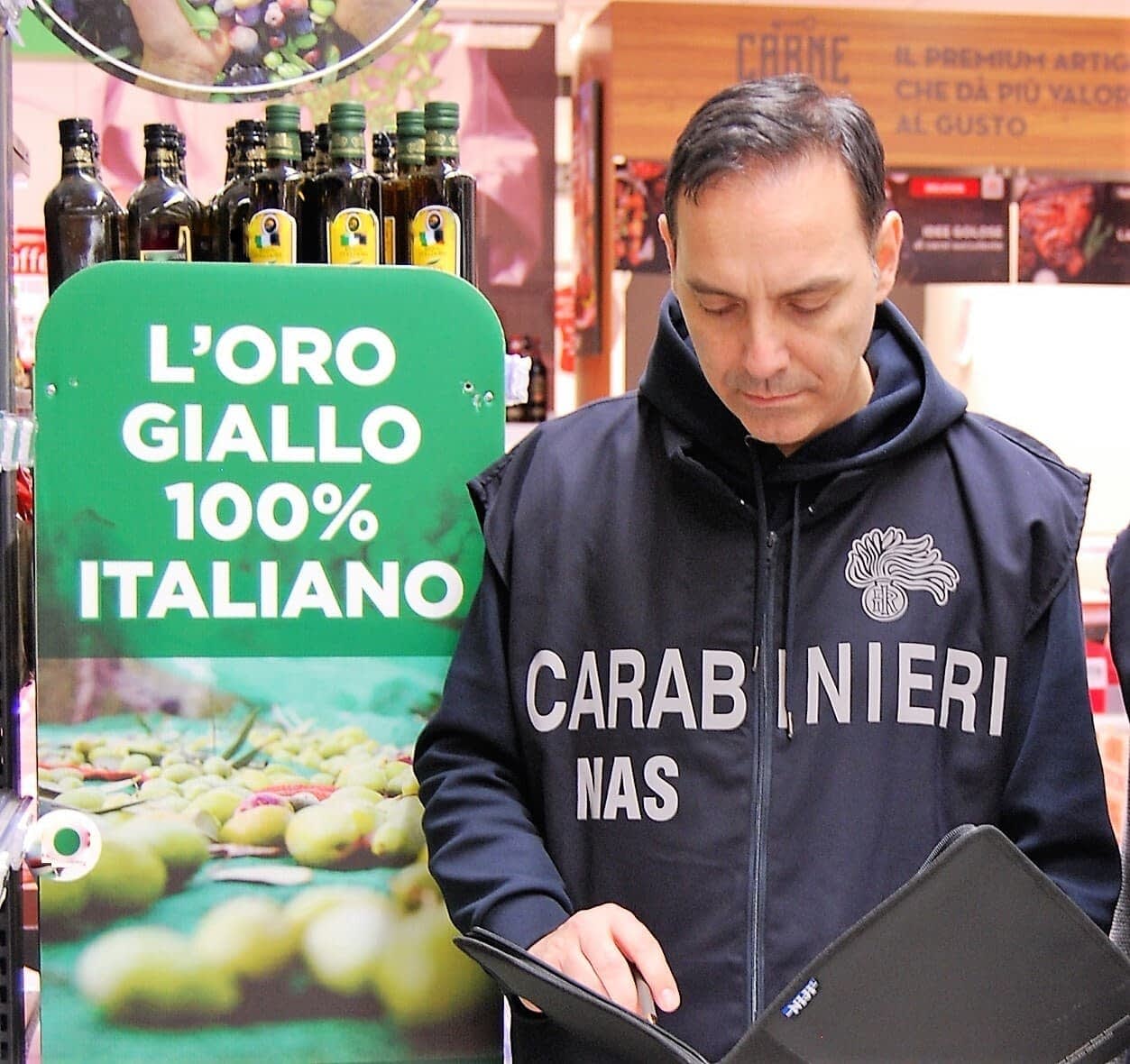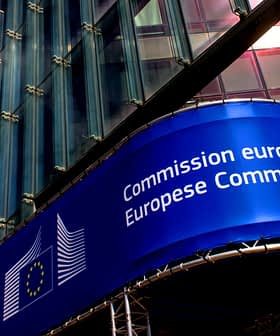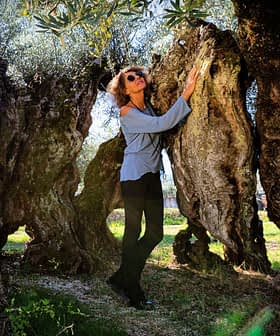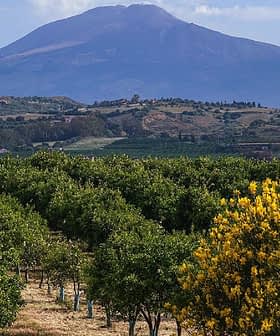Italian Police Official Explains How Olive Oil Fraud Works
As the ways in which olive oil fraud is perpetrated have evolved, law enforcement has worked hard to keep up.
 Carabinieri officers inspect potentially fraudulent olive oil during a raid. (Photo: Carabinieri NAS)
Carabinieri officers inspect potentially fraudulent olive oil during a raid. (Photo: Carabinieri NAS)  15.0K reads
15.0K readsThe olive oil industry faces significant challenges due to fraud and counterfeiting operations, particularly in Italy, where specialized police units are actively working to combat illicit food trade, focusing on olive oil adulteration. Criminal organizations target genuine, high-quality olive oil, falsely labeling products as PDO or PGI, which undermines legitimate producers and poses health risks to consumers. To address this issue, Italian law enforcement agencies are conducting extensive investigations and implementing measures to safeguard the production chain and traceability of olive oil products.
Fraud and counterfeiting operations continue to pose significant challenges for the olive oil industry.
In Italy, one of the world’s largest olive oil producers, specialized police units are actively combating the illicit food trade, explicitly focusing on olive oil adulteration.
Genuine, high-quality olive oil is a prime target for criminal organizations. Counterfeit olive oil, falsely labeled as a PDO (Protected Designation of Origin) or PGI (Protected Geographical Indication), undermines legitimate producers and poses serious risks to consumer health.
A very low price for products like extra virgin olive oil is often a sign of low-quality oil, likely imported or blended with seed oil.
For criminals, counterfeit high-quality food can yield substantial profits. This trend is prevalent across many staples of Italian cuisine, with olive oil being a particularly lucrative target.
The Central Inspectorate for the Protection of Quality and Fraud Repression of Agri-food Products (ICQRF), an agency under the Ministry of Agricultural and Forestry Policies, reported that in 2023 alone, 380 tons of illegal olive oil products, with a value exceeding €2 million, were seized.
“Extra virgin olive oil, along with PDOs and PGIs, are premium products that continue to grow in volume and market share,” Lieutenant Colonel Michele Avagnale, commander of the Carabinieri Health Protection Group (NAS) in Naples, a specialized unit within the Italian police forces, told Olive Oil Times.
See Also:Leveraging AI to Enhance Olive Oil Quality, Efficiency and Trust“Italy’s olive oil industry involves numerous key players, from producers and olive mills to both primary and secondary processing industries, as well as companies that purchase Italian and foreign olive oil to create blends or bottle and sell it to the final distribution companies,” Avagnale explained.
“Similar types and grades of olive oil can be legally blended,” he added. “European Union legislation stipulates that a legitimate extra virgin olive oil blend consists solely of extra virgin olive oils that belong to the same commercial category and fully comply with extra virgin olive oil regulations.”
This is where illegal blending comes into play, undermining the market and posing potential threats to consumer health.
“When we talk about food fraud, I would speak about tangible damages rather than risk factors,” Avagnale said. “Food fraud is a serious threat to public health. Criminals seek to deceive consumers by selling products that do not match what is stated on the label.”

Lieutenant Colonel Michele Avagnale commands a national police unit dedicated to fighting and preventing food fraud. (Photo: Carabinieri NAS)
Avagnale warned that food fraud inflicts damage in multiple ways, resulting in economic losses for consumers, businesses and the state.
“Public health may also be damaged since food containing harmful substances or those which alter the nutritional balance may be marketed,” he said. “Illegal blending involves mixing virgin or extra virgin olive oils with lower-quality oils, known as ‘lampante.’ These oils are then treated to remove any organoleptic or chemical defects.”
Advanced blending technologies are also exploited to perpetrate olive oil fraud.
“Illegal blending can also involve linking containers of substandard products to those containing quality oil, blending them through specialized software,” Avagnale said. “Using this software, criminals can produce a product whose organoleptic and chemical parameters meet the E.U. regulations for extra virgin olive oils.”
The accessibility of the technology has enabled criminal organizations to refine their operations, exploiting the popularity of olive oil for profit. Consequently, NAS has also had to enhance its technology and methods.
“Agri-food crime has evolved over the years,” Avagnale said. “It no longer involves crude, easily detectable counterfeits through random sampling, such as the partial or complete blending of extra virgin olive oil with soybean, sunflower or palm oils mixed with chlorophyll or beta-carotene.”
“Today, these crimes involve far more sophisticated frauds, making them difficult to detect with standard scientific analyses,” he added. “We often need to rely on genetic or other experimental analyses. In some cases, every individual batch of olive oil should be checked before blending.”
“Moreover, packaging and labeling methods have also advanced,” Avagnale explained. “The use of high-quality materials and imaginative names makes it even more challenging to identify non-compliant products.”
NAS investigations may involve environmental and phone surveillance, inspections, controls, comparisons and extensive paper and electronic documentation analysis.
“Additionally, companies often operate through networks of shell companies and use systems of false invoicing, complicating the reconstruction of commercial transactions,” Avagnale said. “These companies are typically linked to frontmen.”
“In the end, investigative activities often require the participation of international organizations and specific legal support,” he added. “During many investigations, it turned out that some products are purchased in one country, processed in another and sold elsewhere, making controls more difficult.”
Over 1,000 NAS agents are deployed across Italy, forming part of a broader food and pharmaceutical safety network operating throughout the E.U.
See Also:Discovery of Adulterated Olive Oil Kindles Debate Over Testing in Northern CyprusItalian law enforcement’s coordination with national and international agencies allowed for some of the most significant anti-counterfeiting and anti-fraud operations conducted in more than one olive oil-producing country.
The most recent large-scale operation involved discovering more than 71 million tons of illicit oily substances in the southern Italian region of Puglia.
“With olive oil, NAS investigations often begin with on-the-spot checks, frequently initiated by reports from consumers or associations,” Avagnale said.
NAS verifies compliance with regulations through sampling and extensive laboratory analysis.
“When a non-compliant product is identified, safeguard procedures are immediately implemented,” Avagnale said. “These measures include suspending the business license, withdrawing the specific product and conducting further verification activities related to the production chain, traceability and commercial distribution.”
To help combat the international nature of food and olive oil fraud, E.U.-wide alert systems, such as RASFF (Rapid Alert System for Food and Feed), are integrated into NAS activities.
“Established in the late 1970s, this tool has evolved to include materials and objects intended to come into contact with food, as well as pet food,” Avagnale said. “The system is accessible online, allowing all participants to share, activate and notify relevant information in real-time.”
Avagnale emphasized that consumers can play a crucial role in reducing and combating food fraud, particularly in the olive oil sector, listing some simple recommendations consumers may follow:
- Purchase products from trusted stores and markets, not from improvised vendors;
- Learn how to recognize raw materials, their origins and their history;
- Read product labels carefully before purchasing to understand the exact composition of the food (ingredients, additives, preservatives), storage methods, expiration date, producer’s name, production batch, and the origin of raw materials;
- Give preference to seasonal foods with a “short supply chain” or “zero kilometers,” and opt for healthy, preferably home-cooked, meals;
- Be wary of over-processed food with numerous ingredients and unclear or barely readable labels;
- Learn to recognize the distinct characteristics of foods;
- Exercise caution with low prices.
“A very low price for products like extra virgin olive oil is often a sign of low-quality oil, likely imported or blended with seed oil,” Avagnale said, providing a specific example of a NAS investigation into olive oil fraud.

High olive oil prices at origin have made counterfeiting extra virgin olive oil especially lucrative. (Photo: Carabinieri NAS)
“It resulted in the judicial recognition of criminal responsibility for all involved, leading to various prison sentences and additional penalties, including trading prohibitions,” he said.
The investigation began with a document search that uncovered handwritten notebooks and folders containing off-the-books records hidden inside a trapdoor.
“The company under investigation operated with a pyramidal structure: the chairman of the board of directors, who led the organization, managed intra-community oil trades, directed employees in assembling each batch, and supervised the chemical laboratory’s work,” Avagnale said.
“Next in line was the administrative director, who acted in place of the chairman during his absence and managed relationships with the banks,” he added. “As for the employees, one managed the placement of bulk products in the market, while another served as the sales representative.”
Meanwhile, Avagnale said another employee handled the products’ constitution, assembly and filtration, which were then stored in the company’s warehouse.
“He was often responsible for blending the product, strictly following the chairman’s directives,” Avagnale added. “Additionally, the company employed an administrative worker responsible for updating the National Agricultural Information Service (SIAN).”
SIAN is a mandatory electronic register where companies must record every entry, withdrawal, and blending of virgin and extra virgin olive oil. “It is part of an extensive control system overseen by external entities like the ICQRF,” Avagnale said.
“The chairman, the director and the employee responsible for maintaining the SIAN register were charged with complicity in falsifying records and notifications under Article 484 of the Italian Penal Code,” he added. “They had entered false data into the system regarding the purchase, movement, and processing of the oil batches stored in the company, intending to market virgin and extra virgin olive oil.”
“The comparison between accounting and non-accounting documentation, the results from the SIAN electronic register, and surveillance activities revealed discrepancies between what was officially recorded and what was sold, indicating efforts by the company to conceal fraud from the control authorities,” Avagnale explained.
The alleged fraud was categorized into commercial fraud, related to the product’s organoleptic characteristics, and fraud concerning geographical origin, which involved illegal blending.
“In the investigations concerning fraud related to the product’s organoleptic characteristics, investigators utilized environmental and wire surveillance in addition to analyzing accounting and non-accounting records,” Avagnale said.
“What enabled investigators to obtain a detailed and accurate understanding of events were the notebooks, manuscripts and folders labeled ‘internal cuts’ and other similar records,” he added. “The illegal activity involved the national and international wholesale of large batches of olive oil.”
Avagnale said the documents detailed how the company imported lampante olive oil from Spain and Italy in bulk before blending them, bottling and labeling the product as extra virgin olive oil.
“This was supported by chemical-physical and organoleptic controls conducted by the internal laboratory,” Avagnale explained. “These materials were irregular, consisting of products with very high levels of peroxide and acidity.”.
“Furthermore, large quantities of olive oil differed in origin and quality due to using raw materials of varying nature and origin,” he added. “Nevertheless, they were sold to buyers and labeled as extra virgin olive oil or 100 percent Italian extra virgin olive oil, leading to charges under Articles 515 and 517-bis of the Italian Penal Code for commercial fraud, aggravated by the misuse of the origin protection mark.”
Share this article









